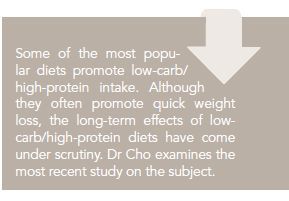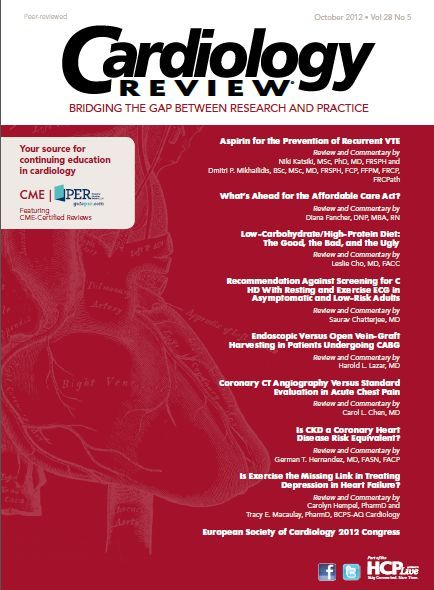Publication
Article
Cardiology Review® Online
Low-Carbohydrate/High- Protein Diet: The Good, the Bad, and the Ugly
Leslie Cho, MD, FACC
Review
Lagiou P, Sandin S, Lof M, Trichopolous D, Adami H-O, Weiderpass E. Low carbohydratehigh

protein diet and incidence of cardiovascular diseases in Swedish women: prospective
cohort study. BMJ. 2012;344:e4026. doi:10.1136/bmj.e4026.
With the growing national and worldwide obesity epidemic, numerous diet plans have been proposed to combat this serious health problem. The most popular diets have promoted low-carbohydrate and high-protein intake (low-carb/high-protein). The short-term effect of such diets appears to be quick weight loss; however,
their long-term effects have raised concerns, particularly with respect to cardiovascular outcomes. In the past several years, there have been some confusing data regarding low-carb/high-protein diets in the medical literature. In the Nurses’ Health Study, the long-term effect of such a diet was not associated with an increased incidence of ischemic heart disease.1 However, 3 smaller studies—mainly in the European population—have shown that such a diet significantly increased cardiovascular mortality.2-4
Study Design

A new study by Lagiou et al has entered into the controversy.5 This large, prospective study is the second from the same investigators to look at the effect of a low-carb/high-protein diet in a cohort of Swedish women. In their previous study, published in 2007, the authors looked at low-carb/high-protein diets in a young (30-49 years old) cohort of women and followed them for 12 years. The present study followed the same cohort of Swedish women, again using an extensive dietary questionnaire.
Data were gathered from 43,396 Swedish women aged 30 to 49 years at baseline, who were followed up for an average of 15.7 years. Using the Swedish
nationwide database, the authors looked not only at mortality, but were also able to assess incident cardiovascular disease, ischemic heart disease, ischemic stroke, hemorrhagic stroke, subarachnoid hemorrhage, and peripheral arterial disease. They estimated the intake of protein and carbohydrate for each participant using the validated residual method, which allows evaluation of the “effect” of an energy-generating nutrient, controlling for the energy generated by this nutrient, by using a simple regression of that nutrient on energy intake to calculate the residual.
The study found that women who had a diet low in carbohydrates and high in protein significantly increased their risk of cardiovascular disease, ischemic heart disease, and ischemic stroke in a dose-dependent manner. The low-carb/high-protein diet had no effect on hemorrhagic stroke, subarachnoid stroke, or peripheral arterial disease. The authors state that an increase of 5 g of protein and a decrease of 20 g of carbohydrate daily is associated with a statistically significant 5% increase in the overall risk of cardiovascular disease.5
References
1. Halton, TL, Willett WC, Liu S, et al. Lowcarbohydrate- diet score and the risk of coronary heart disease in women. N Engl J Med. 2006;355:1991-2002.
2. Lagiou P, Sandin S, Weiderpass E, et al. Low carbohydrate-high protein diet and mortality in a cohort of Swedish women. J Intern Med. 2007;261:366-374.
3. Sjogren P, Becker W, Warensjo E, et al. Mediterranean and carbohydrate-restricted diets and mortality among elderly men: a cohort study in Sweden. Am J Clin Nutr.
2010;92:967-974.
4. Trichopoulous A, Psaltopoulou T, Orlanos P, Hsieh CC, Trichopoulous D. Low-carbohydrate- high-protein diet and long-term survival in a general population cohort. Eur
J Clin Nutr. 2007;61:575-581.
5. Lagiou P, Sandin S, Lof M, Trichopolous D, Adami H-O, Weiderpass E. Low carbohydrate-high protein diet and incidence of cardiovascular diseases in Swedish women: prospective cohort study. BMJ. 2012;344:e4026.
6. Willett WC. Low-carbohydrate diets: a place in health promotion? J Intern Med.2007;261:363-365.
7. Fung TT, van Dam RM, Harkinson SE, Stampfer MJ, Manson JE, Willett WC. Lowcarbohydrate diets and all-cause and causespecific mortality: two cohort studies. Ann
Intern Med. 2010;153:289-298.
8. Preis SR, Stampfer MJ, Spiegelman D, Willett WC, Rimm EB. Dietary protein and risk of ischemic heart disease in middleaged men. Am J Clin Nutr. 2010;92:1265-
1272.
9. Preis SR, Stampfer MJ, Spiegelman D, Willett WC, Rimm EB. Lack of association between dietary protein intake and risk of stroke among middle-aged men. Am J Clin Nutr. 2010;91:39-45.
10. Pan A, Bernstein AM, Schulze MB, et al. Red meat consumption and mortality: results from 2 prospective cohort studies. Arch Intern Med. 2012;172:555-563.
11. Bernstein AM, Sun Q, Hu FB, Stampfer MJ, Manson JE, Willett WC. Major dietary protein sources and risk of coronary heart disease in women. Circulation. 2010;122:876-883.
CommentaryDifferent Sources of Protein Are Key
Why does this study’s findings differ from those of Willett et al in the Nurses’ Study? One theory to account for the difference that has been proposed by Willett et al is that the differences in the sources of protein (animal versus plant), types of carbohydrates consumed (highly refined starch and sugar), and the preparation and processing of the products might explain the conflicting findings.6 Certainly this has some merit. Recently, the report by Fung et al from the Nurses’ Health Study and the Health Professionals Follow-up Study found that there was a statistically positive association between a low-carb diet of mainly animal protein and cardiovascular mortality, and a negative association between a low-carb diet of mainly vegetable origin and cardiovascular mortality.7
In other words, diets low in carbohydrates and high in animal protein increased cardiovascular events, and a low-carb/high vegetable protein diet decreased cardiovascular events. Additionally, in the Health Professionals Follow-up Study, there was again an association between stroke and ischemic heart disease with diets low in carbohydrates and high in animal protein.8,9

In both studies, there was a statistically nonsignificant increase in cardiovascular mortality with the low-carb/high-protein diet. This is most likely due to combining into 1 group the diets high in both animal and vegetable protein. There have also been studies showing that an increase in red meat consumption appears to increase the risk of cardiovascular disease.10,11 Thus, the data appear to show that a long-term diet of low carb/high protein (high animal protein) increases cardiovascular disease. Unfortunately, this new study by the Lagiou group did not obtain information about the type of carbohydrate and protein—animal versus plant—that was consumed.5
Can this finding in young Swedish women be generalized to the US population? I think the answer is yes. Even though this particular study is done on a younger (30- 49 years of age), thinner population than is reflected in US studies (body mass index [BMI]>30 is only 5.7% of the whole cohort, while in the Nurses’ Study it was over
30%) and researchers assessed their diet only at enrollment, the findings are still applicable given similarities in dietary patterns in the 2 populations.
The great attraction to lowcarb/ high-protein diets is weight loss. The easy weight loss may lead people to adopt this type of diet for the long term to maintain weight loss. While the low-carb/ high—vegetable protein diet may have cardiovascular benefits,7-9 most patients who go on low-carb/high-protein diets elect to have diets high in
animal protein because they are often the cheapest and most easily accessible. Thus, what this study shows us is that even in this low-risk population of young, thin women, a diet low in carbohydrates and high in protein can increase the risk of cardiovascular disease long term. In the fight against obesity, where much confusion reigns among both patients and physicians about what diet to recommend and follow, we are reminded once again that a healthy diet is one of moderation.
About the Author
Leslie Cho, MD, FACC, is Director of the Cleveland Clinic Women’s Cardiovascular Center. She is also Section Head of Preventive Cardiology and Rehabilitation in the Robert and Suzanne Tomsich Department of Cardiovascular Medicine at Cleveland Clinic. Dr Cho is board certified in interventional cardiology, cardiovascular medicine, and internal medicine, and specializes in heart disease in women.
